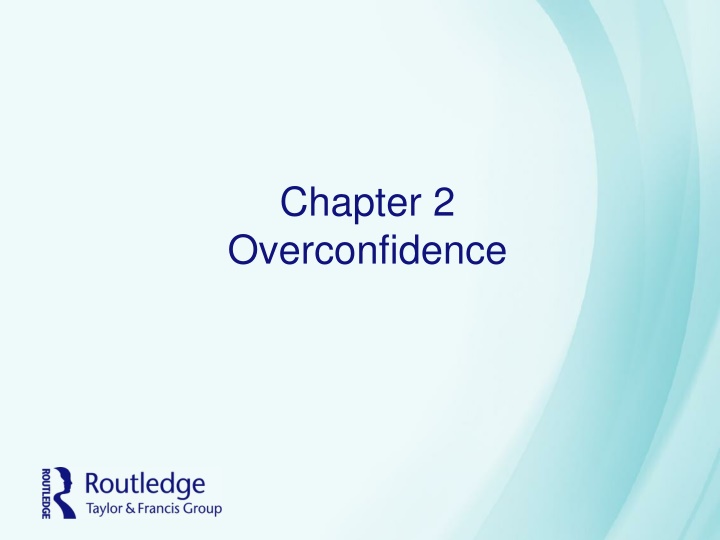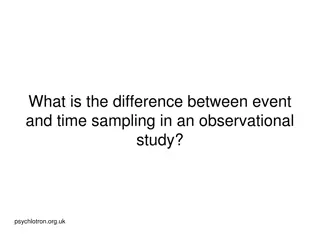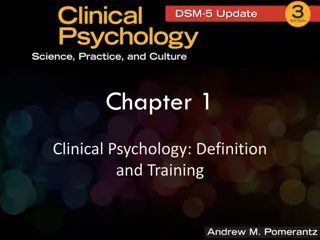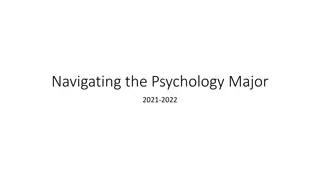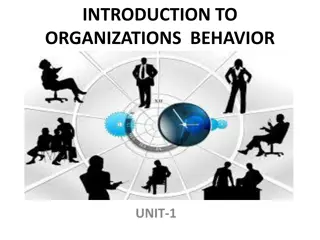Overconfidence in Psychology
Overconfidence is a common cognitive bias where individuals have unwarranted faith in their abilities, leading to miscalibration of probabilities and overestimation of skills. This phenomenon affects decision-making in various aspects of life, including business, driving, investing, and trading. Overconfident individuals tend to take more risks and trade excessively, resulting in lower returns and underperformance in comparison to the market averages. Psychologists have identified the better-than-average effect, which contributes to people believing they are above average in various tasks. The impact of overconfidence on investing is significant, as overconfident investors tend to trade more frequently and interpret information too narrowly, leading to suboptimal outcomes. This bias is more pronounced in masculine tasks, where men tend to exhibit higher levels of overconfidence than women. Understanding overconfidence is crucial for improving decision-making and promoting financial well-being.
Download Presentation

Please find below an Image/Link to download the presentation.
The content on the website is provided AS IS for your information and personal use only. It may not be sold, licensed, or shared on other websites without obtaining consent from the author.If you encounter any issues during the download, it is possible that the publisher has removed the file from their server.
You are allowed to download the files provided on this website for personal or commercial use, subject to the condition that they are used lawfully. All files are the property of their respective owners.
The content on the website is provided AS IS for your information and personal use only. It may not be sold, licensed, or shared on other websites without obtaining consent from the author.
E N D
Presentation Transcript
Chapter 2 Overconfidence
Overconfidence Psychologists have determined that people can be overconfident Miscalibration probability distribution too tight Likely range of possibilities Confidence intervals Better-than-average effect Unrealistically positive view one s skills, knowledge
Example of Overconfidence Starting a business is risky Most new businesses fail Authors asked 2,994 new business owners about chance of success Owners thought they had a 70% chance Owners thought their competitors had a 39% chance 3
Overconfidence Question: How good of a driver are you? or Question: How good of an investor are you? Compared with the broad market averages, are you above average, average, or below average? Few believe they are below-average drivers or investors. Obviously, many people are simply mistaken because they are overconfident about their skills and knowledge. People are more overconfident when they feel they have control over the outcome, even when this is not the case. 4
Overconfidence and Investing Overconfident investors trade too much get lower returns as a result take more risk 5
Excessive Trading Overconfident investors trade too much because they are too certain about their opinions Precision of information Skill in interpretation In masculine tasks, men are more overconfident than women Investing is perceived as a masculine task 6
Impact on Return A study of 1,607 investors which moved from a traditional discount broker to an online broker service showed that: Before going online: average turnover was 70% beat the market by 2.4% per year After going online: turnover jumped to 120% Under-performed the market by 3.5% per year 9 Brad Barber and Terrance Odean, 2002, Online Investors: Do the Slow Die First? Review of Financial Studies, 15, 455-487.
Those Who Speed Also Trade More Those who get more speeding tickets also conduct more stock trades. 10 Source: Grinblatt and Keloharju (2007)
Overconfidence Affects Risk Overconfident investors systematically under-estimate the level of risk they take. Own riskier stocks (IPOs, smaller firms, newer firms, etc.) Under diversify The portfolio of single men have the highest volatility and beta, and smallest firms. The high turnover group invested in smaller firms with higher betas. Good performance by the overall stock market prompts higher trading volumes by high-risk traders 11
Financial Analysts Financial analysts predict future earnings levels for the firms they follow. The analysts with the best forecasts recently are lucky? are good? If good, then they will have fewer forecasting errors than other analysts in the future. If lucky, they may get overconfident: After studying 40,000 quarterly predictions, past success is followed by greater errors. 12 Gilles Hilary and Lior Menzly, Does Past Success Lead Analysts to Become Overconfident? Management Science 52(2006): 489 500.
Professional Money Managers.. Are Overconfident Average annual mutual funds turnover is 77% Average turnover for this year of last years winners, 93%. Mutual funds under-perform their benchmarks by an average 1.8% per year. Controlling for company size, institutions like higher volatility stocks. 13
Illusions Illusion of Knowledge The illusion that more information creates more knowledge and better predictions Does telling you the results of the last 5 flips of a coin help you predict what the next flip will be? The internet is full of information How much is true? Individual investors over-estimate their ability to predict stock performance, thinking that the Internet has given them all the necessary information Can you turn this info into wisdom?
Illusion of Control People often believe that they have influence over the outcome of uncontrollable events. Craps players throw harder when they want higher numbers and softer for lower numbers People are more likely to bet on the toss of a coin before it is flipped People choose their own lottery numbers, thinking they can pick the winners These illusions may cause investors to trade too much and eventually experience lower returns! 15
The key attributes that foster the illusion of control are choice, outcome sequence, task familiarity, information, and active involvement Choice Making an active choice induces control. For example, people who choose their own lottery numbers believe they have a better chance of winning than people who have numbers given to them at random. Outcome Sequence The way in which an outcome occurs affects the illusion of control. Early positive outcomes give the person a greater illusion of control than early negative outcomes do. Task Familiarity The more familiar people are with a task, the more they feel in control of the task. 16
Information When a greater amount of information is obtained, the illusion of control is greater as well Active Involvement When a person participates a great deal in a task, the feeling of being in control is also proportionately greater. Past Successes Overconfidence is learned through past success. If a decision turns out to be good, then it is attributed to skill and ability. If a decision turns out to be bad, then it is attributed to bad luck. 17
Online Trading In the old days, an investor would have to call a broker to place a trader order. Now an investor clicks a mouse a few times. The act of calling the broker and speaking the trade out loud acts like a gatekeeper a review of the idea. Trading online provides no frictions to limit the outcomes of overconfidence, thus, they trade more 18
Studies show that when an investor goes online, the trader increases trading by about 50% Does that additional trading create higher returns? No 19 Brad Barber and Terrance Odean, Online Investors: Do the Slow Die First? Review of Financial Studies 15 (2002): 455 487.
Robinhood Trading App First broker to offer no-commission trading Gamification of trading process Young, inexperienced customers Ramifications: Trade more than other online brokerage customers Mistake attention for information Herd in the same small set of stocks These actions illustrate overconfidence 20 Brad M. Barber, Xing Huang, Terrance Odean, and Chris Schwarz, Attention-Induced Trading and Returns: Evidence from Robinhood Users, Journal of Finance, (2022, forthcoming).
Summary People can be overconfident about their abilities, knowledge, and future prospects. Overconfidence leads to excessive trading, which lowers portfolio returns. Lower returns result from the commission costs associated with high levels of trading and the propensity to purchase stocks that underperform the stocks that are sold. 21
Summary Overconfidence also leads to greater risk taking due to under diversification and a focus on investing in small companies with higher betas. Individual investors are most likely to get overconfident after experiencing high returns, like after a strong bull market. 22
